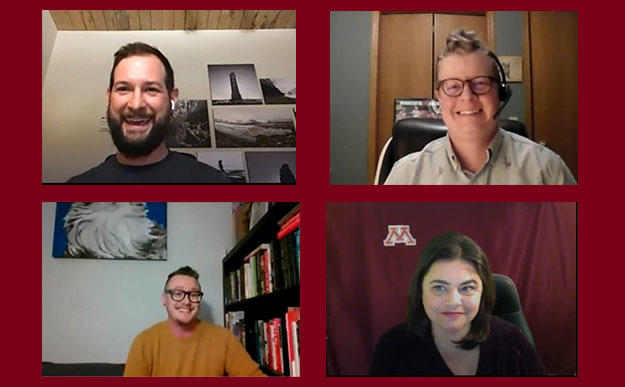Making your oral health practice a safe space for the LGBTQ community

“When we know better, we do better.”
Evan Lonning, MS, LPCC, mental health clinician at Boynton Health, summed up the intent of a Continuing Dental Education webinar on LGBTQ+ inclusivity in healthcare.
The January 20 webinar kicked off this year’s Digital Grand Rounds series, set to focus on issues of diversity, equity and justice in oral and overall health.
Lonning joined fellow panelists Jay Callahan, MS, LPCC, therapist at Ellie Family Services; Dylan Karsten, director of health services programs and innovation for Planned Parenthood North Central States; and moderator and CDE director Jo Peterson, PhD.
The three experts explored how their experiences working with sexual and gender minority patients in healthcare settings might translate to the dental setting.
The role of treating a whole individual, understanding their background and how that history impacts care, emerged as a key message.
“Each person brings their entire life experience to an appointment,” Lonning shared. “It’s not always visible, so you’ve got to be deliberate.” They reminded attendees that individual and community traumas may create an aversion to or a fear of care.
Karsten agreed, sharing that “dental professionals need to consider the oral health of their patients through the lens of patients’ fear of discrimination.”
The fear of being misgendered or not accepted for oneself is often compounded by systemic and historic marginalizations that make routine care feel impossible, according to Lonning. “Employment rates among the LGBTQ community are often lower, and we so often access healthcare through our employers,” they explained.
And even for transgender individuals who have health insurance, it’s often not what they need it to be. Lonning explained that with only 58% of Fortune 500 companies covering medical needs related to transgender health, those individuals may become frustrated and confused by their insurance or be unable to afford routine care due to skyrocketing bills in other medical areas.
Barriers continue at the individual level for fear of violations of dignity. Instances of misgendering or use of a dead name--the legal name assigned to an individual at birth that’s often on medical forms but might not reflect an individual’s identity--cause real and lasting trauma. Callahan called it “the most constant poke that people get.” He explained that our language uses pronouns quite frequently, and they’ve often been weaponized to oppress people’s identities.
Lonning expounded on the idea of a poke, saying, “one poke is no big deal. But if it keeps happening, by the time someone gets to me, that can be a really big deal.” They suggested that responding with compassion and correcting oneself, while avoiding the urge to over-apologize or put one’s emotions around such a mistake on the patient, can begin to heal that wound.
Panelists also shared ways that healthcare professionals and dental professionals in particular can create spaces that are not only safe, but welcoming for members of the LGBTQ community.
“Patients are always listening” in an open space like a dentist’s office, Callahan said. When they hear a dentist treat their staff with openness and respect, that teaches the patient that this is an inclusive environment.
Karsten suggested attendees start with the basics, like forms and interactions. “Do your forms have a place to indicate pronouns and chosen name?,” he suggested asking of oneself. “Are you providing accessible restrooms?”
Approaching new experiences with openness and honest curiosity is important, too, says Callahan. “You need to know the right spaces where it’s okay to ask questions, and when it feels safe, be curious.” Karsten agreed: “Asking questions in the right environment helps build trust and makes the patient want to come back.”
Moving beyond a safe, trusting space, the panelists shared ways that oral health professionals can provide additional support for patients. Karsten shared, “One thing I like to do in my role is offer a space for someone to try out names or pronouns, see if they feel right,” he said. “Depending on your relationship with a patient, you can try that in a dental space, too. It’s a real relationship builder.”
And most importantly, the panel emphasized the importance of consistent, long-term support that’s reflected in real effort. “We see a lot of organizations that show up for Pride month in June,” Lonning explained, “but then it all disappears. If it’s just about a statement, what are you doing?” They suggested that a commitment to personal growth and backing up an organizational statement with policy and communication changes can make the difference between an empty gesture and a real impact.
The webinar kicked off this year’s Digital Grand Rounds series and will be available for viewing on CDE Anytime in March. Learn more and register for upcoming sessions on health-focused mentoring in Near North and the oral health safety net for Native American families.